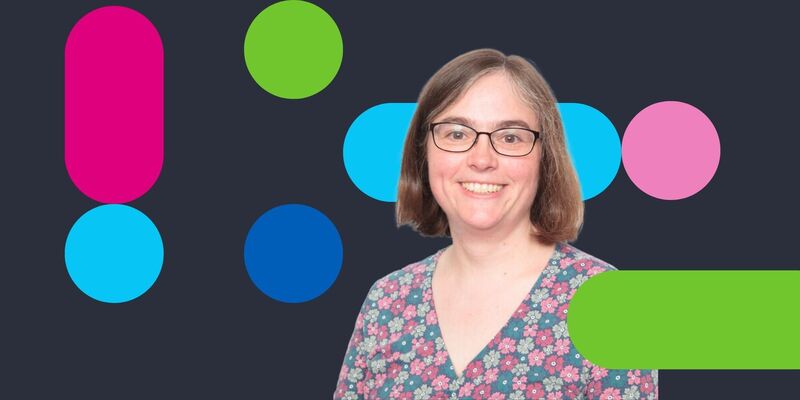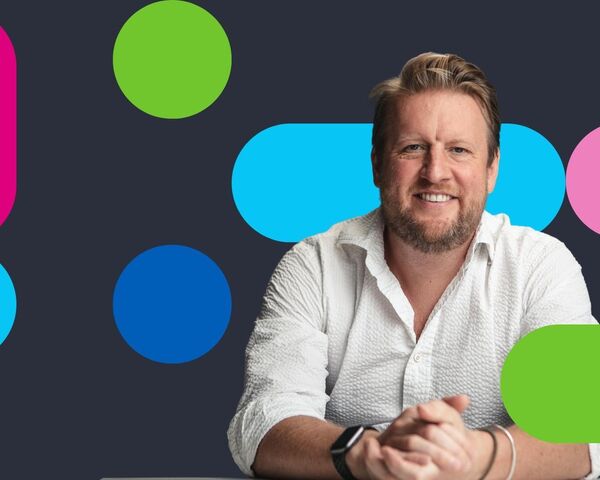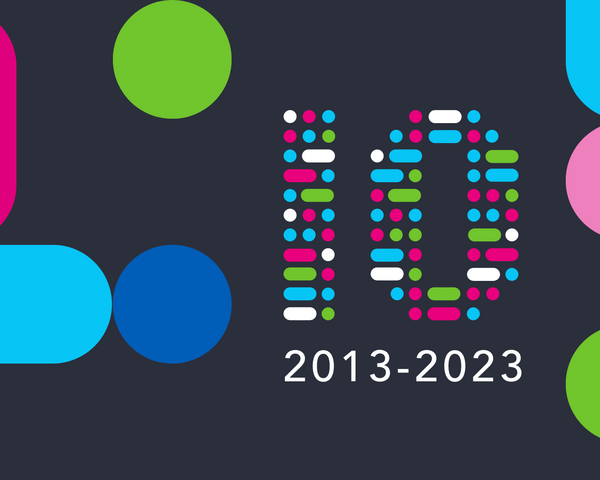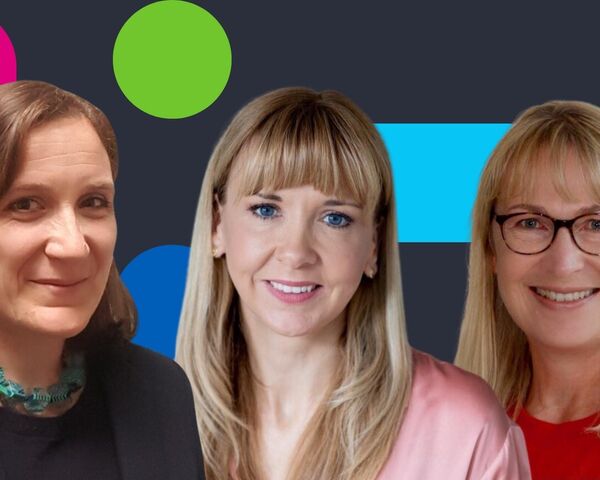Being a clinician in a changing genomics landscape
By Ellen Thomas on
This year we celebrate 10 years of Genomics England. I’ve been with Genomics England for 8 years of this journey so as we celebrate the milestone, I wanted to share some insights into how far we have come since the 100,000 Genomes Project was launched in 2013.
It is also a good time to reflect on where we’re currently at and what my personal hopes are for the future as we continue to work towards changing the clinical landscape over the next decade, and beyond.
Setting the stage for the 100,000 Genomes Project
As a clinician working in genetics at the turn of the 21st century, genetic testing options were limited. We could examine the overall pattern of a patient’s chromosomes using a microscope, and if we could recognise certain conditions well enough, we could test one gene at a time. But in many cases, we were confident patients had a genetic diagnosis; we just didn’t have any testing to investigate that.
By 2010, improved ‘next-generation’ sequencing technologies meant that we could sequence every gene in many individuals, massively improving our knowledge of genetic disorders and the genetic basis of diseases. It also showed that a lot of people had less typical forms of conditions that we thought we knew all about already.
The NHS is fortunate to have a brilliant network of genetics laboratories and expert clinical scientists, with a history of innovation going back many decades, providing strong foundations for this work.
However, even with these great advances in technology and knowledge, we continued to see many families with likely genetic conditions where we couldn’t find a causative change in the genome.
The last decade has seen massive national and international efforts to understand and close this diagnostic gap.
I have been incredibly lucky in the timing of my career – when I started my PhD at Imperial College in 2007, my research group had just acquired a next-generation sequencing machine – so I (along with many others) spent that time working out how you can harness these innovative technologies to answer patients’ questions. This knowledge would later help me when I joined Genomics England and the 100,000 Genomes Project.
With these technologies, it became possible to sequence large amounts of DNA. Researchers were also finding DNA variations that older tech would’ve missed.
All of this, coupled with cutting edge projects such as the Deciphering Developmental Disorders (DDD) project – established by the Wellcome Trust Sanger Institute in collaboration with the NHS to investigate developmental disorders in children – were instrumental in setting the stage for the 100,000 Genomes Project.
Being part of an ambitious project
The 100,000 Genomes Project launched in 2013 with 2 main arms: rare disease and cancer. I joined Genomics England just as the pilot phase of the project was completing recruitment and the main phase was starting.
The questions the Project was setting out to tackle felt like a natural fit for my interest: how to take genomic technologies and use them at scale in the NHS to answer patients’ questions about how their genome has influenced their health.
The Project was very broad in its ambitions. Patients joined with pretty much any cancer tumour type, or any condition where an NHS clinician thought, ‘I think there's something genetic going on here’.
Before patients came into the Project, they’d had all the available standard NHS testing. What we saw, unsurprisingly, was that in conditions like developmental disorders – where it's often very difficult to recognise a disorder and there's a huge range of possible explanations – whole genome sequencing could help to uncover diagnoses that previously would not have been detectable.
I got involved straight away in questions like ‘what information do you need about a patient’s symptoms and condition to make good use of their genomic data?’, and ‘if you need to answer questions about a patient’s genome and its contribution to their healthcare, when is it helpful to study some family members alongside the patient themselves, and when is that not so relevant?’.
We started from this very broad approach. Through the course of the Project, we learned a lot about how you do and don't use genomics for diagnostics in the NHS – lessons which have informed the approach that the NHS Genomic Medicine Service is now taking.
Challenges in getting results to patients and what we learned
Because we were doing things for the first time at this scale, and a major aim of the Project was to investigate how this would work best in the context of the NHS, a lot of the 100,000 Genomes Project was about addressing challenges across the whole end-to-end process, working closely with colleagues at the NHS England Genomics Unit.
We started by working out how to identify patients who could benefit, and making sure NHS colleagues had the right resources to help those patients understand the Project and what it would mean for them. We also figured out how we could get the right samples and data collected from them.
Once those elements of the process had been embedded with our partners across the NHS, we then moved on to the process of analysing genomes and clinical data together in a partially automated way. This included how to return the outputs of that analysis to clinical scientists in NHS labs who were able to make sense of it for patients.
This process took longer to set up than we expected (a recurring theme in delivering a project at this scale). We were hugely grateful to all our participants for coming with us on that journey and contributing so generously to that learning through their participation.
Ten years on, where we’re at today
Having had 10 years of experience with genome sequencing as a national ecosystem, I think we're in a really good position to take a good look at all the amazing knowledge we’ve gained from the Project.
Analysis for NHS patients
Working with the NHS England Genomics Unit and NHS Genomic Medicine Service, we've set up a system where large-scale whole genome sequencing can be offered at a national level. We know there’s a massive drive from patients and clinicians who want these tests and this service. And through this centralised service, we have been able to crystallise the learning from the Project and the ongoing genome sequencing, to better understand how the service is working, and how to improve it for the future.
We know there is still an exciting journey ahead in improving and innovating with the systems and processes we are using for this work, to reach equitable, scalable use of genomics for everyone who can benefit for their healthcare.
And we need to remember that not all patients with rare disease or cancer will have a condition which can be managed better through the use of genomics – it is really important to make sure that other areas of research and service development are being pushed forward to drive improvements for those patients too.
Research for future discoveries
Patients having whole genome sequencing testing in the NHS are offered the choice to join the National Genomic Research Library (NGRL). The NGRL holds genomic and health data securely, from participants of the 100,000 Genomes Project and other research efforts.
Approved researchers can then investigate the data in this library to understand genomics and health and develop new diagnostic approaches and treatments.
Sometimes, researchers make new diagnoses which would be useful to research participants in the course of their work. We’ve set up a process called ‘diagnostic discovery’, which helps them to feed these findings back to the NHS labs and clinicians, to be returned to patients.
This direct feedback loop from research into healthcare is one of the innovations I am most proud of having worked on. Because of it, I’ve seen patients receive complex and important diagnoses, sometimes many years after their first round of genetic testing.
Overall, we've returned about 1,500 new diagnoses in the last year through diagnostic discovery. Having started my career in genetics in the days when every individual genetic diagnosis was shared and celebrated amongst the whole of my department, the scale of what we are doing is incredibly exciting.
Finding the sweet spot over the next 10 years
Even after these huge advances, there are still lots of families where we suspect a genetic condition but we can’t find the cause – and some of this is because we are still working to understand the full complexity of how the genome works. This means that the next decade will continue to be driven by the goal of finding diagnoses for ever more patients – and increasingly then using those diagnoses to personalise their healthcare.
We will continue to make progress by consolidating an ecosystem where patients, the public and clinicians choose to use patient data to harness the learning from all the diagnostic testing we’ve done to make future testing as good as possible, within the NHS and research systems.
This will be supported by ongoing work to ensure clinicians can access the training and resources they need to support patients to make informed choices about the use of their genomic data.
That includes helping patients to feel comfortable with the fact that we're not telling people about each other's medical problems, but we are bringing their data together in the background to make sense of the bigger picture.
With the advent of brand-new approaches to treating rare disease such as targeted nucleotide-based interventions (which are now starting to be used more widely for a small number of conditions) we need this connected ecosystem to make sure we can find the patients who can benefit from new drug trials based on their genomic diagnosis.
The other area where there is lots more to come from genomics is in predicting future health problems – which is much harder than explaining existing symptoms. The research programme we are launching to investigate the role of genomics in allowing us to treat children with rare diseases earlier by using genomic testing at birth will provide amazing insights into the complexities and possibilities of predictive genomics.
I think that Genomics England – with our experience of big data, big tech, genomics and bioinformatics, and public dialogue and engagement – has the expertise and the infrastructure to help. We also can bring all the knowledge from having sequenced and analysed 100,000 genomes to support the NHS, working in collaboration with the NHS.
If that happens, then I will feel that it has all been massively worthwhile.
About the author
Dr Ellen Thomas is the Deputy Chief Medical Officer at Genomics England, and an honorary Consultant in Clinical Genetics at Guy’s and St Thomas’ NHS Trust. She worked on delivery of the 100,000 Genomes Project in the Genomics England clinical team and now co-leads our contributions to the NHS Genomic Medicine Service, as well as supporting the interface between research and clinical care for participants and the Genomics England researcher community.


